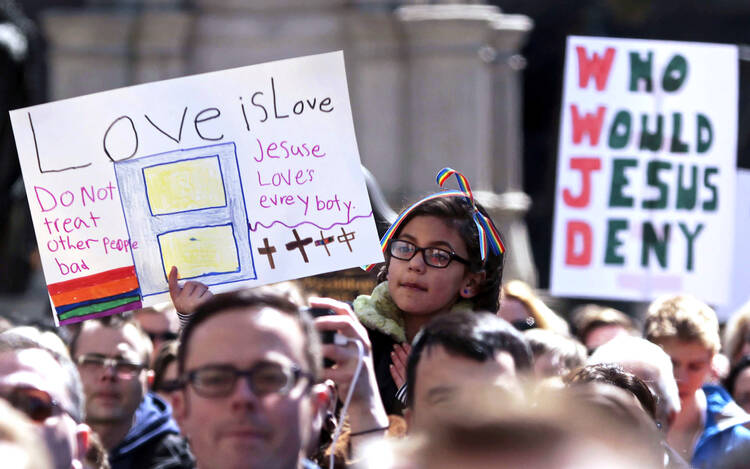When the U.S. Commission on Civil Rights began research for its report on the “uncertain boundaries” of religious freedom in 2013, Hobby Lobby was just a craft store and Obergefell was hardly a household name. Three years later, landmark decisions by the Supreme Court to recognize both the religious liberty claims of closely held corporations and the right of same-sex couples to marry have given new urgency to the question at the center of the report. How should we as a country balance the sincerely held religious beliefs of people and institutions with the potential for unjust discrimination on the basis of gender, sexual orientation and other markers of identity?
Unfortunately, the findings of the commission’s report, “Peaceful Coexistence,” published on Sept. 7, leave little room for middle ground or dialogue. Most of the authors instead paint a zero-sum world, where antidiscrimination laws are “of pre-eminent importance” and where religious exemptions from such statutes are seen to “significantly infringe upon” civil rights and are used, in the words of Martin S. Castro, the chairperson of the commission, as “both a weapon and a shield by those seeking to deny others equality.” No credible rationale is offered to explain why sexual autonomy should be given primacy of place over religious liberty, despite the latter’s explicit protection under the Constitution.
Further, anyone concerned to preserve the robust religious liberty protections in the U.S. constitutional tradition will be taken aback by Mr. Castro’s charge that the term “religious liberty”—the scare quotes are his—has become a code for “discrimination, intolerance, racism, sexism, homophobia, Islamophobia, Christian supremacy or any form of intolerance.” This is a shockingly confident dismissal of a fundamental American value. Religious liberty is hardly the exclusive purview of Christians and is in many ways most vital for religious minorities with less political clout. And Mr. Castro’s implicit condemnation of views on gender identity and the meaning of marriage held by millions of Christians, Jews and Muslims—and shared by most Americans not so long ago—as beyond the bounds of acceptable public discourse is incendiary and counterproductive to the report’s stated goal of reconciliation. That is a shame because taken as a whole, the report, while nonbinding, advances vital questions about how to balance competing rights and worldviews that will require the good-faith engagement of everyone interested in building a just, pluralistic society.
Among the commission’s recommendations are that courts and lawmakers should tailor religious exemptions to civil rights protections “as narrowly as applicable law requires,” that Congress should clarify the federal Restoration of Religious Freedom Act so that it applies only to individuals and religious institutions and that where R.R.F.A. and equivalent state-level laws do not apply, exemption laws should “protect religious beliefs rather than conduct.”
While a clearer framework for understanding when and to whom religious exemptions apply would certainly be helpful, the commission’s neat separation of “belief” and “conduct” is misguided. The Catholic faith does not end with the sacrifice at the altar or the recitation of the creed but is lived out in schools, hospitals, homeless shelters and countless other ministries of the church. As Archbishop William Lori of Baltimore said in response to the report: “Catholic social service workers, volunteers and pastors don’t count the cost in financial terms or even in personal safety. But, we must count the cost to our own faith and morality.”
Recent experience shows where the commission’s hollowed-out understanding of the Constitution’s “first freedom” leads. Starting in 2006, branches of Catholic Charities USA around the nation had to choose between violating their institutional consciences by placing children with unmarried and same-sex couples or losing their government contract—without which they would shut down. In Boston, San Francisco, Washington, D.C., and Springfield, Ill., the adoption agencies indeed closed their doors. Today, there are activists and politicians who would gladly see Christian universities with traditional morality codes or Catholic hospitals that refuse to perform abortions suffer the same fate.
But if Catholics are to make a full-throated defense of robust religious liberty, we should also acknowledge the ways the church itself has contributed to the atmosphere of distrust around this cause. Asserting religious liberty primarily on “culture war” issues draws attention only to the church’s policing of moral lines, to the detriment of its proclamation of the good news and service to those in need.
For generations, the church in the United States has provided succor and support for millions of Americans, regardless of religion. This is not a historical accident but the result of the good works of myriad Catholics and an American context that allows believers to freely practice their faith in all spheres. This tradition must continue.








